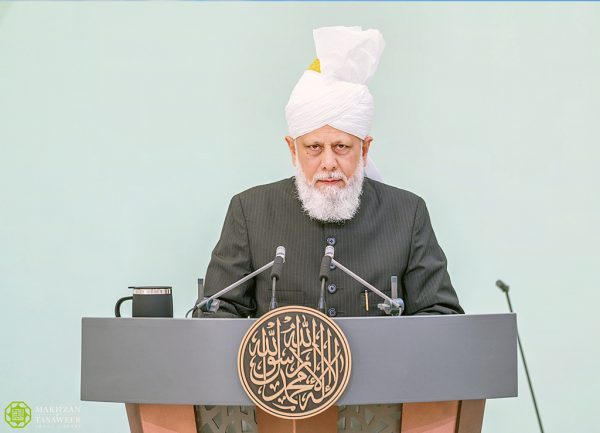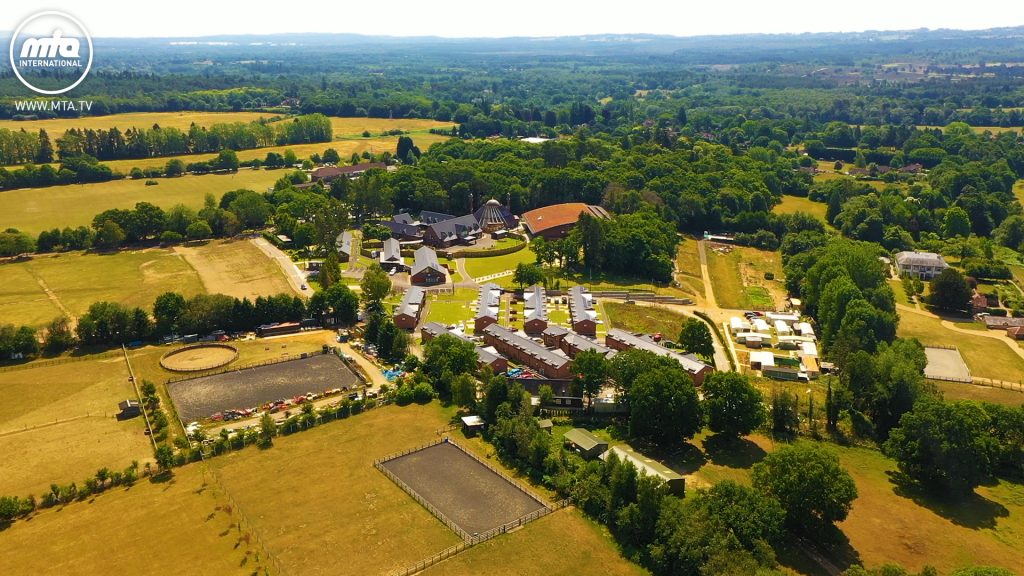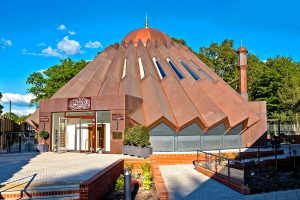After reciting Tashahhud, Ta‘awwuz and Surah al-Fatihah, His Holiness, Hazrat Mirza Masroor Ahmad (aba) said that he has been relating incidents pertaining to the Battle of Uhud.

Why Some Companions Left Their Posts on the Hill
His Holiness (aba) said that during the battle, the disbelievers suffered great loss at the hands of the Muslims and they were forced to flee. However, despite the Holy Prophet’s (sa) instructions, most of the Companions stationed upon the hill left their post, causing the Muslims to endure great loss. Upon seeing the disbelievers flee, the Muslims went after them, and in their hastiness, despite calls not to, many archers on the hill also went after the disbelievers. Many historians have commented that the hastiness of these Companions was due to their desire to obtain the spoils of war. However, it does not seem accurate to assert this regarding the Companions of the Holy Prophet (sa).
His Holiness (aba) has said that some historians have based this assertion upon their understanding of the following verse of the Holy Qur’an:
‘And Allah had surely made good to you His promise when you were slaying and destroying them by His leave, until, when you became lax and disagreed among yourselves concerning the order and you disobeyed after He had shown you that which you loved, He withdrew His help. Among you were those who desired the present world, and among you were those who desired the next. Then He turned you away from them, that He might try you—and He has surely pardoned you, and Allah is Gracious to the believers.’ (The Holy Qur’an, 3:153)
His Holiness (aba) said that when the Companions were ready to sacrifice anything and everything they had for the sake of Islam and the Holy Prophet (sa), when they had already given everything they had, and they even desired the station of martyrdom then it cannot be said that the Companions were chasing after the spoils of war. These wars were not fought for the sake of spoils, rather the spoils would be a secondary result of the battle. Hence, it does not seem accurate to say that the Companions left the hill out of their desire to hastily seek spoils. Rather, it seems more likely that upon seeing the disbelievers flee, they assumed the certain victorious end to the battle. Or, they saw that their brothers were engaged in face-to-face combat and sought to partake. However, their appointed leader Hazrat Abdullah bin Jubair (ra), was calling out to them to remain in their posts.
His Holiness (aba) quoted Hazrat Mirza Bashiruddin Mahmud Ahmad (ra), who described that the worldly desire referred to in the above-quoted verse was the Companions’ desire to actively take part in face-to-face combat, which was certainly a worldly desire as compared to the instructions they had been given by the Holy Prophet (sa) to remain at their post. In other words, whereas they had a commandment from the Prophet of Allah, they sought something which, upon the surface, seemed to be more enticing, in other words engaging in the active battle for the sake of Allah. Furthermore, from their vantage point, thinking that the battle had been won, the Companions on the hill certainly would have wished to join their brothers in rejoicing over this victory. This explanation would be more fitting for the honour of the Companions of the Holy Prophet (sa).
His Holiness (aba) said that upon seeing the Muslims had let their guard down, Khalid bin Walid circled back with the remaining Makkan army and attacked the Muslims. Amra, a woman from the Makkan army, took up their flag and began waving it fiercely to signal to the fleeing Makkans that they should return. Ultimately, many Muslims were martyred what was once a victory turned into tragedy. Upon this attack by the Makkans, the Muslims were completely scattered and unorganised. They were not in any sort of formal rank and so a frantic scene ensued as they attempted to fend off the Makkan offensive. In the flurry, Hazrat Hudhaifah’s (ra) father was accidentally martyred at the hands of Muslims, as they did not recognise him. Upon learning of this, the Holy Prophet (sa) desired for the blood money to be offered, however, Hazrat Hudhaifah (ra) insisted that he did not wish to take the blood money, thus elevating his rank in the sight of God and His Messenger (sa).
Martyrdom of Hazrat Hamzah (ra)
His Holiness (aba) said that Hazrat Hamzah (ra) was also killed in this battle, and quoted Hazrat Mirza Bashir Ahmad (ra) who writes:
‘Hazrat Hamzah (ra), who in addition to being the real paternal uncle of the Holy Prophet (sa), was also his foster brother, fought valiantly. Wherever he would turn, the ranks of the Quraish would be torn apart. However, the enemy also lay in ambush of him. Jubair bin Mut‘im had especially brought along an Abyssinian slave by the name of Wahshi and promised to free him on the condition that he should find some way and seek revenge by slaying Hamzah (ra), who had killed Ta‘imah bin ‘Adiyy, the paternal uncle of Jubair on the occasion of Badr. As such, Wahshi hid somewhere and lay in ambush of him. When Hazrat Hamzah (ra) attacked someone and passed by this place, the assassin took good aim and threw his small lance below the naval, which immediately penetrated the body and came out the opposite end of his body. Hamzah (ra) staggered and dropped to the ground, but mustered the strength to stand up again and endeavoured to make a leap towards Wahshi, but stumbled to the ground again and gave his life. Thus, a strong pillar of the Muslim army was shattered. When the Holy Prophet (sa) was informed that Hamzah (ra) had been slain, he was deeply saddened. There is a narration that after the Ghazwah of Ta’if, when the assassin of Hamzah (ra) came before the Holy Prophet (sa), although he forgave him, due to his love for Hamzah (ra), he instructed that Wahshi should not come before him. On that occasion, Wahshi resolved in his heart that until he used the same hand by which he martyred the paternal uncle of the Messenger of God, to slay a great enemy of Islam, he would not rest. As such, in the Khilafat of Hazrat Abu Bakr (ra), in the Battle of Yamamah, he fulfilled this vow by slaying Musailimah Kadhdhab, a false claimant of prophethood.’
(Life & Character if the Seal of Prophets (sa), Vol. 2, p. 334)
His Holiness (aba) said that Hazrat Hamzah’s (ra) body was also mutilated after his martyrdom, and his liver was extracted and taken to Hind who chewed on it. Hearing this, the Holy Prophet (sa) was very deeply pained. He went to the body of Hazrat Hamzah (ra) and expressed his immense grief, saying he had never felt pain as he did in that moment. The Holy Prophet (sa) said that the angel Gabriel came and informed him that Hazrat Hamzah (ra) had been recorded in the seven heavens as being a lion.
Forbearance of Hazrat Hamzah’s (ra) Sister Upon His Martyrdom
His Holiness (aba) said that Hazrat Hamzah’s (ra) sister also displayed great patience. Upon seeing her approach, the Holy Prophet (sa) did not wish for her to see the deceased bodies which would have been disturbing, and so the Holy Prophet (sa) sent Hazrat Zubair (ra) to stop her. Upon approaching, Hazrat Zubair (ra) realised it was his mother Safiyyah (ra). As Hazrat Zubair (ra) approached, his mother Safiyyah (ra) pushed him aside, saying that he could not stop her. However, he relayed to her that the Holy Prophet (sa) had instructed that she should not go forward as she would see the deceased bodies. Only upon hearing the instruction of the Holy Prophet (sa) did she stop, and then she handed Hazrat Zubair (ra) two sheets which she had brought to shroud the body of her brother, Hazrat Hamzah (ra). She then requested that despite knowing her brother’s body had been mutilated, she wished to see it, and promised not to wail. The Holy Prophet (sa) granted her permission and upon seeing her brother’s body, she stood brave like a lion, and though tears flowed from her eyes, she did not make a single sound. The Holy Prophet (sa) also stood by her, as tears also fell from his blessed eyes.
His Holiness (aba) quoted the First and Second Caliphs, who described the immense patience displayed by the Holy Prophet (sa) upon this tragedy.
His Holiness (aba) said that he would continue narrating these incidents in the future.

Plea for Prayers for Palestinians Amid Continued Injustices Against Them
His Holiness (aba) again urged for prayers for the people of Palestine. May Allah enable the world to truly take action against injustice. Although more voices are being raised and people say that injustices are being perpetrated, however, it seems that everyone is afraid of the Israeli government. Either that, or the Western world is naturally against the Muslim world and harbours hatred against them, due to which they do not wish for the injustices against them to end, or are not taking the necessary actions to bring the injustices to an end. They do not consider that these injustices are being perpetrated against innocent children, women and the elderly. Hence, we cannot fully trust them, however, we must continue striving to help them understand and we must also continue to pray. May Allah enable the Muslim world to bolster its voice so that they may raise their voices and bring an end to these injustices.
Funeral Prayers
His Holiness (aba) said that he would lead two funeral prayers in absentia of the following deceased members:
Sheikh Ahmad Hussain Abu Sardana
Sheikh Ahmad Hussain Abu Sardana who lived in Gaza. He was martyred in recent days as the result of an Israeli airstrike. He is the first Ahmadi to be martyred during the current war. He had studied at Al Azhar University. One day, he arrived in Kababir on the occasion of Eid and attended the Ahmadi mosque, where the missionary spoke about the need for the Imam Mahdi, which piqued his interest. He had been advised by his late father that if he ever learned of the Imam Mahdi, he should pledge allegiance, and so he accepted Ahmadiyyat that very day. He was regarded as a sage scholar by the people in his area. He loved the Holy Qur’an and would complete an entire reading in the span of a week. His wife was also injured in the strike; His Holiness (aba) prayed for her recovery as well. He had profound honour and respect for the Promised Messiah (as) and the Caliphate. He had recorded a voice message for His Holiness (aba) conveying his sentiments to him and renewed his oath of allegiance. His Holiness (aba) prayed that may Allah elevate his station and grant healing to his wife. May Allah accept his prayers for the Palestinian people and establish peace there while also enabling them to accept the Promised Messiah (as).
Uthman Ahmad
Uthman Ahmad of Kenya who recently passed away. He served the Community for many years after accepting Ahmadiyyat. He faithfully fulfilled his oath of allegiance. He translated various books into Swahili. He possessed many great qualities. He was regular in offering tahajjud (pre-dawn voluntary prayers). He respected missionaries a great deal and upheld their honour. His Holiness (aba) commented that the missionaries should also set excellent examples. His Holiness (aba) prayed that may Allah grant him forgiveness and mercy, elevate his station, and enable his children to carry on the legacy of his virtues.
Summary prepared by The Review of Religions




Add Comment